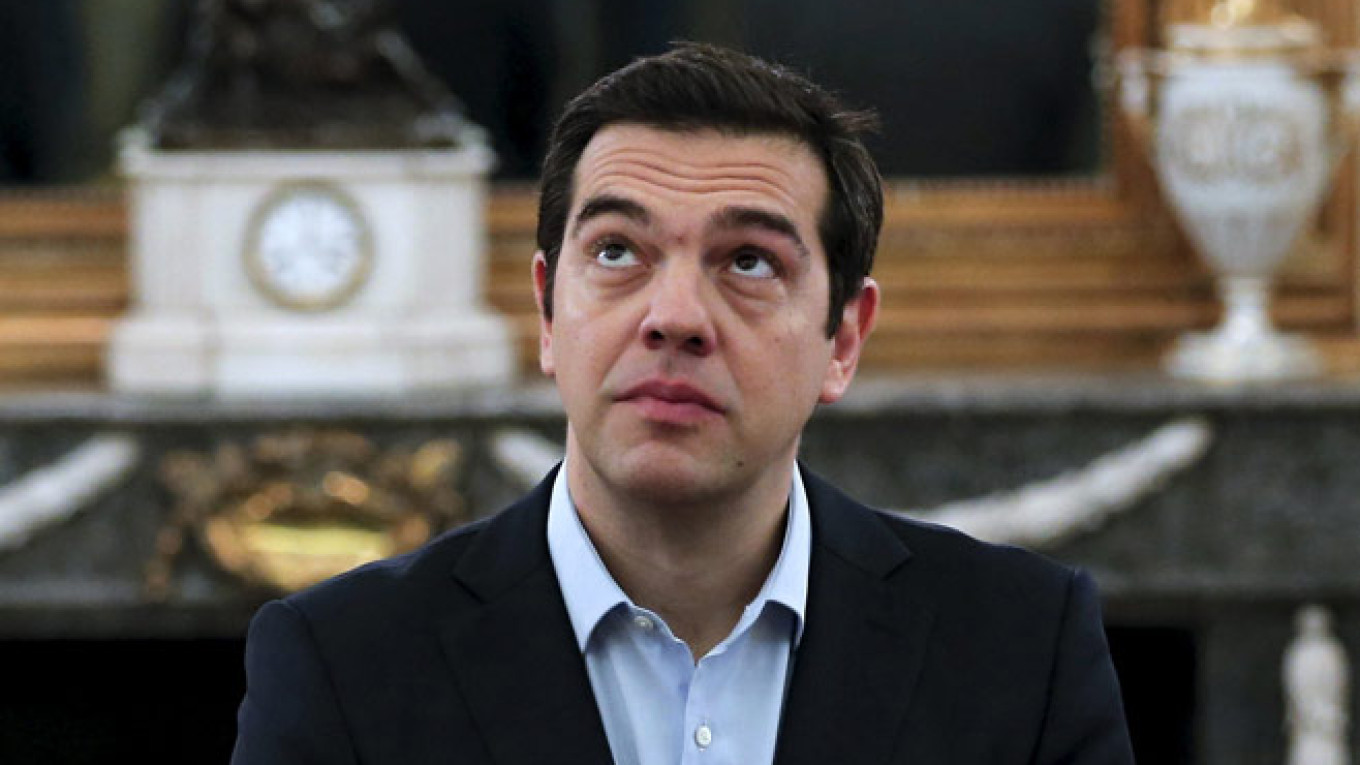Greek Prime Minister Alexis Tsipras' first call outside the Hellenic Republic after the July 5 bailout referendum was to Russian President Vladimir Putin. He was looking for money. Just 1 billion euros ($1.8 billion) — a meager sum in comparison with Greece's total debt — from Russia in the form of short-term bonds or investments in future construction projects would have doubled the liquidity in the Greek banks.
Tsipras' call to the Kremlin was an attempt to show the Europeans that he had not exhausted all his options, and that he could turn elsewhere for financing. Even if Putin had only promised to invest in future Greek construction projects, it would have strengthened Greece's bargaining power at negotiations with the Europeans. Tsipras made a similar point at the St. Petersburg Economic Forum in June, saying that Greece was "unafraid of sailing in large seas, in new seas, in order to reach new and more secure ports."
So why didn't Putin throw Greece a lifeline? Because Putin understands democracy: Syriza was not in power six months ago, and thanks to free and fair elections, might be out of power six months from now. Putin promised former President Viktor Yanukovych's Ukraine — where elections were demonstrably less free — $15 billion. The Kremlin eventually doled out $3 billion, and is still trying to get its money back.
Indeed, Putin prefers not to give money to democratic countries unless he can get something tangible in return—like blocking EU sanctions, which Greece is incapable of doing. Russia only cares about a few specific things that Greece can offer. Russia would like to participate in privatizing DEPA (Greece's monopolistic state natural gas corporation) and buy the gas transportation system in order to sell gas directly to consumers throughout the country rather than at its borders. Unfortunately for the Kremlin, the EU's "Third Energy" package won't allow it.
One might expect Russia to delight at Grexit and the breakdown of the euro zone. But it hasn't really. Of course, Russia has benefitted politically from the Greek crisis: If the West is unable to bring order and prosperity to relatively affluent Greece, which has existed within Europe for 35 years, how can it promise to single-handedly bring order and prosperity to Ukraine, a much larger, poorer, and more chaotic nation?
Russian diplomats are always trying to exploit rifts and fissures in European unity, and to seize upon a weakness when they see one. Russia would prefer to have Greece as a friend within the EU so that it can use Athens as a lobbying and communication channel. From Russia's perspective, there are pros and cons to Greece's leaving and staying in the euro zone. If it leaves, Moscow gets an inexpensive country where even small investments could pay off big, and rigid European regulations are relaxed. Besides, the economic collapse would soon be followed by debt forgiveness and, likely, growth; no one will let Greece to turn into Zimbabwe, that's for sure.
If it stays, Russia will maintain its activities there, albeit with greater restrictions. It will benefit from working under the well-regulated legal framework of the Economic and Monetary Union, and collect revenue in a global reserve currency immediately. Moscow definitely doesn't want or need the collapse of the euro zone and the European economy: Russia still receives the better part of its export revenue from the EU. Anyone who was expecting a last-minute Russian move to bail out Greece and undermine Europe's negotiations with Athens was badly disappointed. Russia, like many other countries, is terrified of the disruption that Grexit might cause, but is happy to use the crisis to draw attention to the EU's shortcomings.
Alexander Baunov is senior associate editor-in-chief of Carnegie.ru Moscow Center. This is an abridged version of a comment that appeared on Carnegie's Eurasia Outlook blog.
A Message from The Moscow Times:
Dear readers,
We are facing unprecedented challenges. Russia's Prosecutor General's Office has designated The Moscow Times as an "undesirable" organization, criminalizing our work and putting our staff at risk of prosecution. This follows our earlier unjust labeling as a "foreign agent."
These actions are direct attempts to silence independent journalism in Russia. The authorities claim our work "discredits the decisions of the Russian leadership." We see things differently: we strive to provide accurate, unbiased reporting on Russia.
We, the journalists of The Moscow Times, refuse to be silenced. But to continue our work, we need your help.
Your support, no matter how small, makes a world of difference. If you can, please support us monthly starting from just $2. It's quick to set up, and every contribution makes a significant impact.
By supporting The Moscow Times, you're defending open, independent journalism in the face of repression. Thank you for standing with us.
Remind me later.


